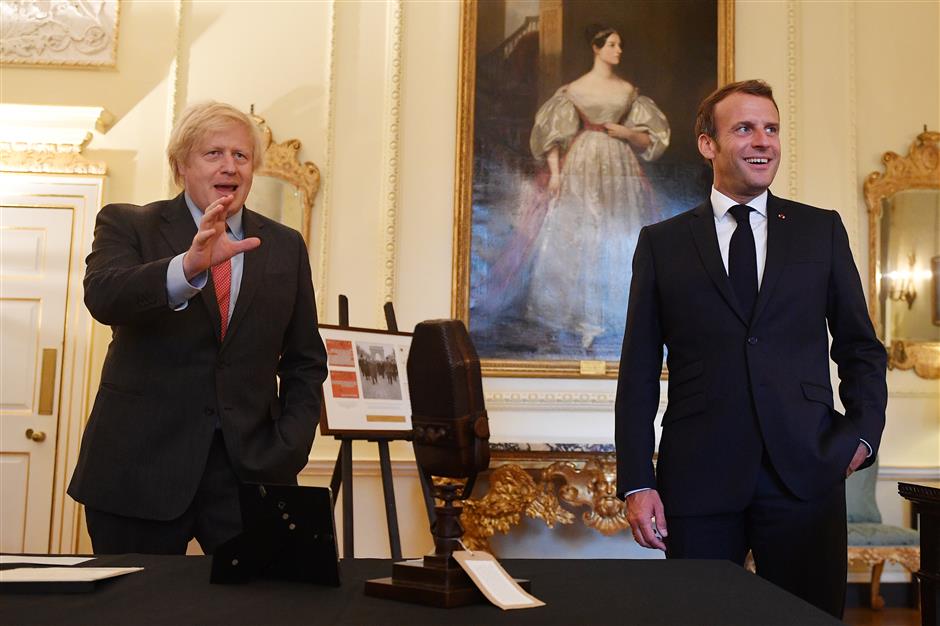Macron visits London to mark de Gaulle's WWII resistance call

French President Emmanuel Macron (R) and Britain's Prime Minister Boris Johnson (L) look at documents and artefacts related to former French president Charles de Gaulle, including an original 1940s microphone like that de Gaulle would have used to broadcast the ‘Appel’ during a visit to 10 Downing Street in central London on Thursday.
French President Emmanuel Macron visited London on Thursday for a ceremony to mark the 80th anniversary of General de Gaulle’s call for wartime resistance, and to discuss Brexit and the COVID-19 pandemic with UK Prime Minister Boris Johnson.
It is Macron’s first trip outside France and one of the most high-profile visits by a foreign leader since countries across the globe imposed lockdowns to curb the coronavirus.
The main focus for Macron was to mark De Gaulle’s “Appel” of June 18, 1940, a radio address he made to the French nation from BBC headquarters in London calling for resistance to the Nazi occupation of France during World War II.
However, it also means Macron and Johnson can hold face-to-face talks on responses to the pandemic, including Britain’s 14-day quarantine of travelers from abroad, as well as post-Brexit negotiations.
Britain left the European Union on January 31 but talks have so far made little progress on a new free trade deal by the end of the year, when a status-quo transition arrangement ends.
Johnson and EU leaders say a deal is achievable, but both sides say time is running out and the prospect of a no-deal outcome remains.
“We’ve agreed on both sides to energize and intensify the talks, we don’t want to hang around, we’re not going to wait for this to be dragged out into the autumn and the winter,” British Foreign Secretary Dominic Raab told LBC radio.
Raab said Macron’s visit to London showed that, despite some difficulties in centuries of Franco-British relations, the two neighbors stood beside each other in times of need.
The French President was welcomed by a guard of honor as he was greeted by Prince Charles, heir to the British throne, and his wife Camilla at their Clarence House home.
They then laid wreaths at a statue to De Gaulle, while Macron also placed tributes at memorials to Queen Elizabeth’s parents, George VI, king during the war, and his wife also called Elizabeth.
Macron also bestowed the Legion d’Honneur, France’s highest distinction, on London in recognition of the city providing a base for De Gaulle, while Britain has honored four French Resistance fighters: Edgard Tupet-Thome, 100; Daniel Cordier, 99; Hubert Germain, 99, and Pierre Simonet, 98.
“That night, De Gaulle became the voice and the breath of Free France,” Macron said of the “Appel.”
“He raised the flame of the resistance higher than a beacon, so that its ray of hope, from the banks of the Thames, shine over the land of France. The man who would carry the destiny of a breathless country. From London. Thanks to London.”

Dame Vera Lynn receives the applause from the audience during a concert in Hyde Park in London, May 6, 1995 commemorating the 50th anniversary of the end of the second world war in Europe.
The occasion has poignantly coincided with the death of singer Vera Lynn at her age of 103 on Thursday. She became a symbol of hope in Britain during World War Two and again during the coronavirus pandemic with her song “We’ll Meet Again.”
Known as the Forces’ Sweetheart, Lynn struck a chord with soldiers fighting overseas and with the public back home through her performances and records, including “The White Cliffs of Dover.”















